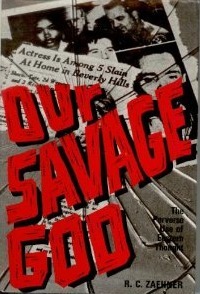The Savage God

The God of the Old Testament is under severe attack. He has been maligned and vilified by several people and in different venues. Many people are offended by the violence in the Old Testament. Some people say that the God of the Old Testament is not the God of the New Testament. Some people say that “there is a demonic or vicious side to his nature.” Others call the God of the Old Testament immoral, abusive, vindictive, savage, and dangerous.
In his book Our Savage God, Robert Zaehner said that the God of the Old Testament, is a God who “appears in a savage guise” (Zaehner 1974: 232). According to Zaehner, the God of the Old Testament is the frenzied God who storms and rages throughout the Old Testament. Zaehner said that the savage God is the God who is vengeful, radical and repugnant. The savage God is a God who is cruel and violent, unjust and harsh (Zaehner 1974: 225).
Richard Dawkins, the atheist who made his fame mocking religion, has one of the most unflattering views about the God of the Old Testament. He wrote: “The God of the Old Testament is arguably the most unpleasant character in all fiction; jealous and proud of it; a petty, unjust, unforgiving, control-freak; a vindictive, bloodthirsty ethnic cleanser, a misogynistic, homophobic, racist, infanticidal, genocidal, filicidal, pestilential, megalomaniacal, sadomasochistic, capriciously malevolent bully” (Dawkins 2006:31).
Gregory Boyd uses disparaging language to describe the God of the Old Testament. This is what Boyd says about the God of the Old Testament: “On the cross, Jesus exposed this sinful god-in-our-own-image to be the blasphemous lie that it is. On the cross, the diabolic violent warrior god we have all-too-frequently pledged allegiance to has been forever repudiated and ‘brought to nothing’” (Boyd 2017: 1261).
Whybray, describing the character of the God of the Old Testament, said that “there is a demonic or vicious side to his nature” (Whybray 2000:1). Whybray also called him “an immoral God,” a “malevolent deity,” “a destroying God, a God of violence” (Whybray 1996: 89-120).
Walter Dietrich says that the God of the Old Testament is “gruesome (Dietrich 2005:4).
In his study of Israel’s testimony to Yahweh, Brueggemann described the God of the Old Testament as “savage, odd, abusive, mean-spirited, wild, self-indulgent, unreliable, unstable, capricious, irascible, irrational, sulky, and more” (Fretheim 1998:33).
David Penchansky called the God of the Old Testament an insecure, irrational, vindictive, dangerous, malevolent, and abusive God (Penchansky 1999: 3).
Cowles believes that the Old Testament distorts the true character of God. Cowles calls Yahweh, the God of the Old Testament, “Yahweh, the genocidal warrior of the Old Testament” and “a genocidal despot” (Cowles 2003:193).
Seibert calls Yahweh the “genocidal general” (2009:32).
All these characterizations of the God of the Old Testament are not true. They contradict the true nature and character of God as revealed in the Old Testament. In my forthcoming book, Divine Violence and the Character of God, I address all these issues in detail. In my book, I study divine violence in light of God’s character as a gracious and merciful God.
In Chapter 13 I deal with “the genocidal God.” In Chapter 15 I deal with the God who caused mothers to cannibalize their own children. In Chapter 16 I deal with the problem of Sodom and Gomorrah. In Chapters 18 and 19 I deal with the Canaanites and the conquest of the land of Canaan. Throughout the book I show how the true character and nature of God reveal what kind of God God is.
The former president of Northern Seminary and a retired pastor wrote about my book: “A profoundly helpful book to scholars, pastors and students of the Bible alike!” The current president of Northern Seminary wrote, “As a former pastor, I especially appreciated the way you brought together the “violent” passages of the Bible, dealt with each one critically, and provided a handy reference for each one.”
Most people believe in God, but they do not know the God in whom they believe. I have written a book to show the other side of God. The Old Testament reveals that God is a gracious and merciful God. My book will help people know the true nature and character of God.
I would like to invite you to help me teach people about the true character and nature of the God of the Old Testament.
1. I invite you to buy a copy of the book for yourself. I guarantee that after reading the book you will develop a deeper appreciation for the God of the Old Testament.
2. Or buy a copy of the book for your pastor or priest. This is the kind of book ministers need to read so that they can gain a better understanding of what kind of God God is.
3. Or give a copy of the book to a person who is struggling with the Old Testament or who is doubting the goodness of God.
Divine Violence and the Character of God is a comprehensive study of the nature and character of the God of the Old Testament. Divine Violence and the Character of God is a book that honors the kind of God the God of the Old Testament is.
Divine Violence and the Character of God will be published at the end of January 2022. You can order a pre-publication copy of the book at 40% discount. If you want to order the book at 40% discount,
1. Send an email to drmariottini@gmail.com
2. On the subject line write: Divine Violence
3. I will send you information on how to order a pre-publication copy of the book at 40% discount.
The 40% discount will be available only on pre-publication orders. Once the book is published, the 40% discount will no longer be available.
I will be taking a few days off. I will return on Monday, January 3, 2022.
HAPPY NEW YEAR.
Claude Mariottini
Emeritus Professor of Old Testament
Northern Baptist Seminary
NOTE: Did you like this post? Do you think other people would like to read this post? Be sure to share this post on Facebook and share a link on Twitter or Tumblr so that others may enjoy reading it too!
I would love to hear from you! Let me know what you thought of this post by leaving a comment below. Be sure to like my page on Facebook, follow me on Twitter, follow me on Tumblr, Facebook, and subscribe to my blog to receive each post by email.
If you are looking for other series of studies on the Old Testament, visit the Archive section and you will find many studies that deal with a variety of topics.
BIBLIOGRAPHY
Boyd, Gregory A. Crucifixion of the Warrior God: Interpreting the Old Testament’s Violent Portraits of God in Light of the Cross. Minneapolis: Fortress Press, 2017.
Cowles, C. S. “A Response to Tremper Longman III.” In Cowles, C. S., Eugene H. Merrill, Daniel L. Gard, and Tremper Longman III. Show Them No Mercy: 4 Views on God and Canaanite Genocide. Grand Rapids: Zondervan, 2003.
Dawkins, Richard. The God Delusion. Boston: Houghton Mifflin, 2006.
Dietrich, Walter. “The Mark of Cain: Violence and Overcoming Violence in the Hebrew Bible.” Theology Digest 52 (2005): 4.
Fretheim, Terence E. “Some Reflections on Brueggemann’s God.” In God in the Fray: A Tribute To Walter Brueggemann, edited by Tod Linafelt and Timothy K. Beal. Minneapolis: Fortress Press, 1998.
Penchansky, David. What Rough Beast? Images of God in the Hebrew Bible. Louisville: Westminster John Knox, 1999.
Seibert, Erik A. Disturbing Divine Behavior: Troubling Old Testament Images of God. Minneapolis: Fortress Press, 2009.
Whybray, R. N. “The Immorality of God: Reflections on Some Passages in Genesis, Job, Exodus and Numbers.” JSOT 12 (1996): 89-120.
Whybray, R. N. “‘Shall Not the Judge of All the Earth Do What Is Just?’: God’s Oppression of the Innocent in the Old Testament.” In Shall Not the Judge of All the Earth Do What Is Right?: Studies on the Nature of God in Tribute to James L. Crenshaw, edited by Paul L. Redditt and David Penchansky. Winona Lake, IN: Eisenbrauns, 2000.
Zaehner, Robert Charles. Our Savage God: The Perverse Use of Eastern Thought. Glasgow: Collins, 1974.












